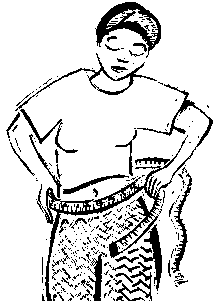|
|
|
| Health Risks of Being Overweight. | |
|
|
Are You Overweight? |
Use the weight-for-height
chart below to see if you are overweight. Find your height in the left-hand
column and move across the row to find your weight. If your weight falls
within the moderate to severe overweight range on the chart, you are more
likely to have health problems. Weights above the healthy weight range
are less healthy for most people.
Weight-for-Height Chart
|
What Is Your Waist Measurement? |
 If you are a woman and your waist measures more than 35 inches, or if you
are a man and your waist measures more than 40 inches, you are more likely
to develop heart disease, high blood pressure, diabetes, and certain cancers.
You may want to talk to your doctor or other health professional about
the health risks of your weight.
If you are a woman and your waist measures more than 35 inches, or if you
are a man and your waist measures more than 40 inches, you are more likely
to develop heart disease, high blood pressure, diabetes, and certain cancers.
You may want to talk to your doctor or other health professional about
the health risks of your weight.
|
What Are the Risks to Your Health of Being Overweight? |
Heart Disease and Stroke
Heart disease and stroke are the leading causes of death and disability
for both men and women in the United States. Overweight people are more
likely to have high blood pressure, a major risk factor for heart disease
and stroke, than people who are not overweight. The good news is that losing a small amount of weight can reduce your chances of developing heart disease or a stroke. Reducing your weight by 10 percent can decrease your chance of developing heart disease by improving how your heart works, blood pressure, and levels of blood cholesterol and triglycerides. Diabetes Noninsulin-dependent diabetes mellitus (type 2 diabetes) is the most common type of diabetes in the United States. Type 2 diabetes reduces your body's ability to control your blood sugar. It is a major cause of early death, heart disease, kidney disease, stroke, and blindness. Overweight people are twice as likely to develop type 2 diabetes as people who are not overweight. You can reduce your risk of developing this type of diabetes by losing weight and by increasing your physical activity. If you have type 2 diabetes, losing weight and becoming more physically active can help control your blood sugar levels. If you use medicine to control your blood sugar, weight loss and physical activity may make it possible for your doctor to decrease the amount of medication you need. Cancer Several types of cancer are associated with being overweight. In women, these include cancer of the uterus, gallbladder, cervix, ovary, breast, and colon. Overweight men are at greater risk for developing cancer of the colon, rectum, and prostate. For some types of cancer, such as colon or breast, it is not clear whether the increased risk is due to the extra weight or to a high-fat and high-calorie diet. Sleep Apnea
Osteoarthritis
Gout Gout is a joint disease caused by high levels of uric acid in the blood. Uric acid sometimes forms into solid stone or crystal masses that become deposited in the joints. Gout is more common in overweight people and the risk of developing the disorder increases with higher body weights. Note: Over the short term, some diets may lead to an attack of gout in people who have high levels of uric acid or who have had gout before. If you have a history of gout, check with your doctor or other health professional before trying to lose weight. Gallbladder Disease Gallbladder disease and gallstones are more common if you are overweight. Your risk of disease increases as your weight increases. It is not clear how being overweight may cause gallbladder disease. Weight loss itself, particularly rapid weight loss or loss of a large amount of weight, can actually increase your chances of developing gallstones. Modest, slow weight loss of about 1 pound a week is less likely to cause gallstones.
|
How You Can Lower Your Health Risks |
If you are overweight, losing as little as 5
to 10 percent of your body weight may improve many of the problems linked
to being overweight, such as high blood pressure and diabetes. For example,
if you weigh 200 pounds and are considered overweight on the weight-for-height
chart, you would need to lose 10 to 20 pounds. Even a small weight
loss can improve your health.
Slow and steady weight loss of no more than 1 pound per week is the safest way to lose weight. Very rapid weight loss can cause you to lose muscle rather than fat. It also increases your chances of developing other problems, such as gallstones, gout, and nutrient deficiencies. Making long-term changes in your eating and physical activity habits is the best way to lose weight and keep it off over time.
Natural Weight Loss |
Additional Resources |
The following organizations have information
and educational materials available to the public on health problems associated
with being overweight.
National Institute of Arthritis and Musculoskeletal and Skin Diseases
National Cancer Institute
National Diabetes Information Clearinghouse
National Digestive Diseases
National Heart, Lung, and Blood Institute Information Center
|